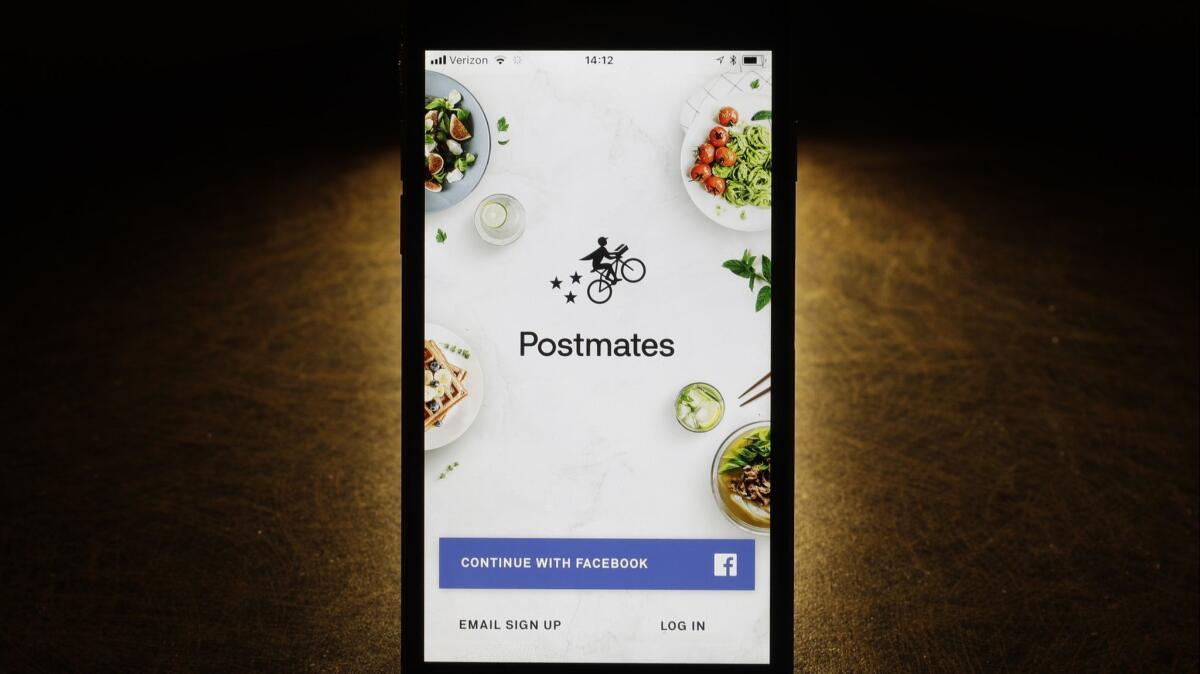Op-Ed: Laws need to get a grip on the gig economy

Former Treasury Secretary Hank Paulson recently predicted that by 2020, half of Americans will be self-employed. While this estimate includes freelancers, small business owners and independent contractors, one big reason for the explosive growth in non-employer work is the gig economy.
Driving for Uber or Lyft, delivering groceries for Instacart and finding handyman jobs through TaskRabbit may be among the best-known gigs, but there are now hundreds, possibly thousands, of such platforms used by millions of American workers on a part- or full-time basis.
This on-demand economy offers real upsides for people who want or need flexible work, but its growth is outrunning every system our country has in place to protect workers. The protections that helped past generations — from unions to minimum wage — may not provide the right answers either.
As a consumer reporter, I became interested in the gig economy while writing about it for various news outlets. I was a freelancer myself and loved the concept, mainly for its promise of flexibility. But as I looked into these job arrangements — and I’ve now examined more than 175 platforms in depth — I was troubled by how little I could find out about each. How much work could you get? How much could you earn per hour or per week? Could you really make a living cobbling together gigs?
At minimum, gig workers should be able to report and halt the type of wage theft that some platforms appear to engage in regularly.
In theory, every gig worker is his or her own boss. You see the bold-print claims in ads or on the platform websites: Work when you want; how you want; where you want. Get paid to take gigs in your spare time. Many suggest wages ranging between $25 and $50 per hour. Dig in, however, and you learn these claims are optimistic, if not complete fabrications.
Meanwhile, many of these supposedly flexible companies make plenty of rigid demands. They dictate that workers wear particular clothes, report their location on apps, commit to set blocks of time and be prompt or pay a penalty.
Indeed, some platforms make so many demands that workers asserted they are not independent contractors at all. That has resulted in lawsuits against Uber, GrubHub, Postmates and others. So far, settlements have mostly preserved the worker-as-an-independent-contractor concept that obviates any wage guarantees.
Granted, self-employment outside of gig platforms doesn’t offer guaranteed pay either. If I don’t write, I don’t get paid. But no one tells me where to work, when to work or how to work. Nor do they threaten to penalize me if I turn down an assignment that pays too little or requires too much time. Those things happen to gig workers all the time.
Worse, when workers are booted from some platforms — the ultimate penalty — they can lose their accumulated wages. The terms and conditions that disclose these unpleasant possibilities often are so well-hidden that the average person would have no way of finding them.
Imposing minimum wage laws on gig platforms doesn’t seem like an ideal remedy. That would likely lead to restricting worker hours, reducing the very flexibility that appeals to most gig workers. (This is ultimately what happened at San Francisco food-delivery service Sprig before it shut down last year.) But some protections are needed. At minimum, gig workers should be able to report and halt the type of wage theft that some platforms appear to engage in regularly.
Moreover, platforms should be required to be forthright about how they pay workers and the risks those workers bear when signed onto the platform. Little do delivery drivers know, for instance, that their auto insurance policy may be invalid when using a car for commercial purposes. If they’re in an accident, they could lose an asset worth thousands of dollars in pursuit of a $5 tip.
Appropriate protections could require only slight changes to current federal laws. After all, we require truth in advertising everywhere else — why not here? Federal law also bars wage theft. Shouldn’t those rules apply to independent contractors?
But such an important and fast-growing segment of the economy ultimately may need its own carefully constructed rule book. According to the annual “Freelancing in America” report commissioned by the Freelancers Union and Upwork, the independent workforce is growing at three times the rate of the U.S. workforce as a whole. Some 57 million workers did some kind of freelance work in 2017. The trick will be to create rules that foster fair play without trampling the entrepreneurial spirit that’s fueling this dynamic industry.
Kathy Kristof is an award-winning journalist and editor of SideHusl.com.
Follow the Opinion section on Twitter @latimesopinionand Facebook
More to Read
A cure for the common opinion
Get thought-provoking perspectives with our weekly newsletter.
You may occasionally receive promotional content from the Los Angeles Times.










